Ben Tan
Practical and Secure Federated Recommendation with Personalized Masks
Aug 18, 2021



Abstract:Federated recommendation is a new notion of private distributed recommender systems. It aims to address the data silo and privacy problems altogether. Current federated recommender systems mainly utilize homomorphic encryption and differential privacy methods to protect the intermediate computational results. However, the former comes with extra communication and computation costs, the latter damages model accuracy. Neither of them could simultaneously satisfy the real-time feedback and accurate personalization requirements of recommender systems. In this paper, we proposed a new federated recommendation framework, named federated masked matrix factorization. Federated masked matrix factorization could protect the data privacy in federated recommender systems without sacrificing efficiency or efficacy. Instead of using homomorphic encryption and differential privacy, we utilize the secret sharing technique to incorporate the secure aggregation process of federated matrix factorization. Compared with homomorphic encryption, secret sharing largely speeds up the whole training process. In addition, we introduce a new idea of personalized masks and apply it in the proposed federated masked matrix factorization framework. On the one hand, personalized masks could further improve efficiency. On the other hand, personalized masks also benefit efficacy. Empirically, we show the superiority of the designed model on different real-world data sets. Besides, we also provide the privacy guarantee and discuss the extension of the personalized mask method to the general federated learning tasks.
Privacy Threats Against Federated Matrix Factorization
Jul 03, 2020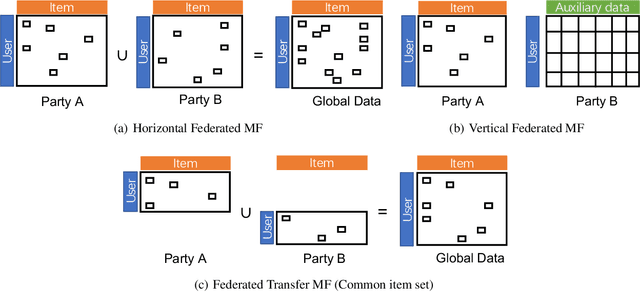

Abstract:Matrix Factorization has been very successful in practical recommendation applications and e-commerce. Due to data shortage and stringent regulations, it can be hard to collect sufficient data to build performant recommender systems for a single company. Federated learning provides the possibility to bridge the data silos and build machine learning models without compromising privacy and security. Participants sharing common users or items collaboratively build a model over data from all the participants. There have been some works exploring the application of federated learning to recommender systems and the privacy issues in collaborative filtering systems. However, the privacy threats in federated matrix factorization are not studied. In this paper, we categorize federated matrix factorization into three types based on the partition of feature space and analyze privacy threats against each type of federated matrix factorization model. We also discuss privacy-preserving approaches. As far as we are aware, this is the first study of privacy threats of the matrix factorization method in the federated learning framework.
Privacy-Preserving Technology to Help Millions of People: Federated Prediction Model for Stroke Prevention
Jun 15, 2020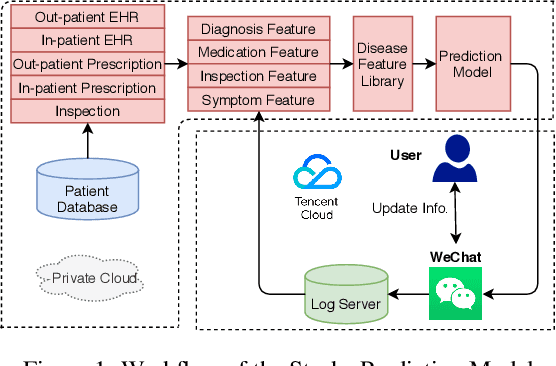
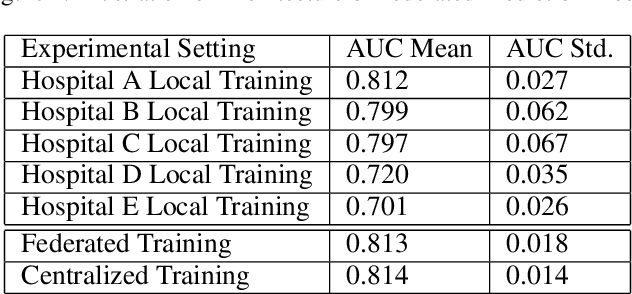
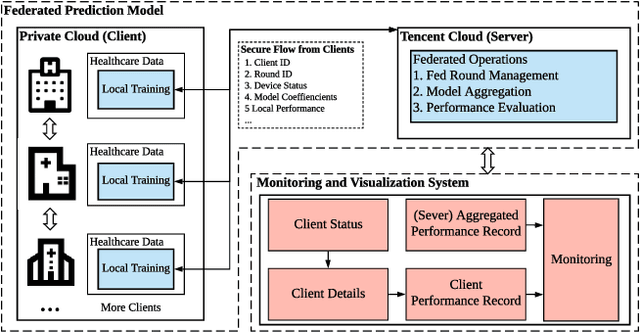
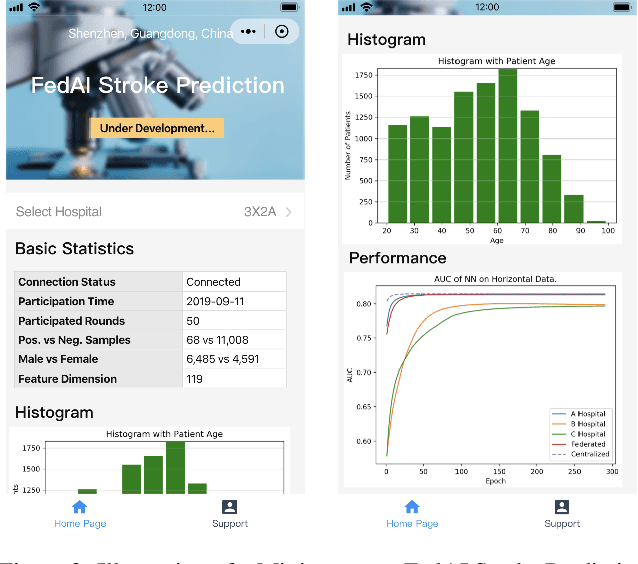
Abstract:prevention of stroke with its associated risk factors has been one of the public health priorities worldwide. Emerging artificial intelligence technology is being increasingly adopted to predict stroke. Because of privacy concerns, patient data are stored in distributed electronic health record (EHR) databases, voluminous clinical datasets, which prevent patient data from being aggregated and restrains AI technology to boost the accuracy of stroke prediction with centralized training data. In this work, our scientists and engineers propose a privacy-preserving scheme to predict the risk of stroke and deploy our federated prediction model on cloud servers. Our system of federated prediction model asynchronously supports any number of client connections and arbitrary local gradient iterations in each communication round. It adopts federated averaging during the model training process, without patient data being taken out of the hospitals during the whole process of model training and forecasting. With the privacy-preserving mechanism, our federated prediction model trains over all the healthcare data from hospitals in a certain city without actual data sharing among them. Therefore, it is not only secure but also more accurate than any single prediction model that trains over the data only from one single hospital. Especially for small hospitals with few confirmed stroke cases, our federated model boosts model performance by 10%~20% in several machine learning metrics. To help stroke experts comprehend the advantage of our prediction system more intuitively, we developed a mobile app that collects the key information of patients' statistics and demonstrates performance comparisons between the federated prediction model and the single prediction model during the federated training process.
Federated Transfer Learning for EEG Signal Classification
Apr 26, 2020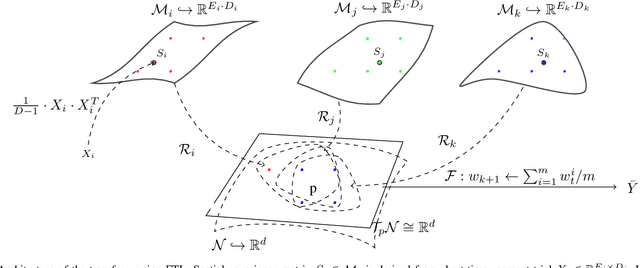



Abstract:The success of deep learning (DL) methods in the Brain-Computer Interfaces (BCI) field for classification of electroencephalographic (EEG) recordings has been restricted by the lack of large datasets. Privacy concerns associated with EEG signals limit the possibility of constructing a large EEG-BCI dataset by the conglomeration of multiple small ones for jointly training machine learning models. Hence, in this paper, we propose a novel privacy-preserving DL architecture named federated transfer learning (FTL) for EEG classification that is based on the federated learning framework. Working with the single-trial covariance matrix, the proposed architecture extracts common discriminative information from multi-subject EEG data with the help of domain adaptation techniques. We evaluate the performance of the proposed architecture on the PhysioNet dataset for 2-class motor imagery classification. While avoiding the actual data sharing, our FTL approach achieves 2% higher classification accuracy in a subject-adaptive analysis. Also, in the absence of multi-subject data, our architecture provides 6% better accuracy compared to other state-of-the-art DL architectures.
 Add to Chrome
Add to Chrome Add to Firefox
Add to Firefox Add to Edge
Add to Edge